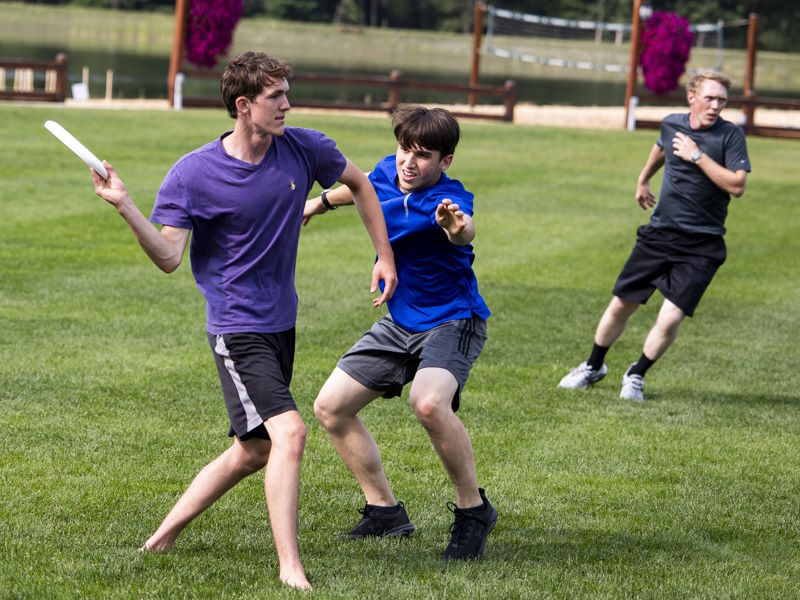Life Lessons from Ultimate: How to Help Young People Thrive in the Real World


One of my favorite sports is Ultimate (Ultimate Frisbee). I love the game and I love to play. Ultimate isn’t the most popular sport and plenty of people have never heard of it. Some people have and may have even played a little here or there, but they haven’t really played seriously.
Let’s assume you have little knowledge of Ultimate and you are walking by a nice grassy field one day and someone invites you to come play with them. You agree, but you find out the group playing is pretty serious and the next thing you know you’re on the field and people are running everywhere. People are shouting weird things like “Force Home!” and “Force away!” and occasionally someone yells, “Up!” or “Huck!” You catch the disc and there’s somebody in your face yelling “Stall 1…2…3…4!” Once you catch the disc and take a step and the person covering you yells, “foul!” and takes the disc from you and explains it’s a turnover. After the first two catches nobody throws to you anymore because when you throw the disc it went all wobbly and hit the ground.
After a few minutes you’re done. You’re frustrated, tired, and confused. People are yelling at you and around you and you don’t understand. You can’t throw right and you can’t figure out who to cover on defense. Everyone else seems to understand and is having a great time and that just makes it more frustrating. You want to quit and decide that sports are dumb and Ultimate is really dumb and maybe you will just go home and read a book.
This is often the way we treat young people trying to become adults. They turn 18 and we want them to instantly be productive, useful, mature people who will quickly gain and apply the skills that will move them from sleeping on your couch (as a dependent child) to sleeping on their own couch (as a fully independent adult). Yet, we push them into this increasingly complicated and confusing world with no more useful preparation than our hapless Ultimate player.
Imagine if, after quitting in frustration and sitting on the sideline, you overheard the captain of the Ultimate team telling a bystander, “The people that try to play these days are hopeless! They can run and catch and throw things, but they just don’t understand how to play the game. Losers!”
Everything would change if the captain of your team came up to you after that first introduction and said, “Let me teach you a few things.” She explains the rules of the game. How to score. What to do on offense. What to do on defense. She shows you the best way to catch and how to throw a disc backhand and how to throw a disc forehand and tells you there are even some other fancy throws that you can learn. Then she sits down with you and explains some fundamental strategies and tactics of the game. She explains the best way to set up and run an offense and score and the best way to set up a defense and keep the other team from scoring. When she is done you understand the rules of Ultimate and you understand how the game should be played. You can visualize what it should look like when the offense and defense on your team are working perfectly.
The future of education in your inbox.
Get productivity tips, commentary, and Unbound updates sent to you!
Does your newfound knowledge mean that when you step back on the field you will be an Ultimate expert that strikes terror in the hearts of your opponents? Far from it. You don’t have much more skill than when you played the first time, but everything has changed. Now you understand what is going on. Now you know what to learn, what to pay attention to, what to practice, what to work on. Now that you know what to do and you can decide how good you want to get at Ultimate you can begin to learn what your limits are…or aren’t. You know what to practice, the question now is how much time and effort do you want to devote to it? How good do you want to be?
Culture and society often treat young people like losers who can’t play the game, while conveniently overlooking the fact that nobody has explained the rules, tactics and strategy to them. We claim that running, throwing, and catching should be enough after teaching them the same general information that has been taught for generations without adding any specialized training for the world that they live in now.
We should be teaching them how to ask better questions in a world where answers are instantly available. We should teach them that taking action is better than constant planning in a world where change and disruption are constant. We should teach them that failure isn’t fatal, but often a powerful way to learn. We should teach them to understand the things that are True, so they can sort through and ignore what is false. Most importantly we should teach them to understand what it means to thrive and live a life of purpose and meaning instead of mindlessly chasing an ever changing culture’s definition of success.
Learning how to throw a disc backhand and forehand and huck it the whole way down the field for a touchdown aren’t bad skills to learn either.


Jonathan Brush is the President and CEO of Unbound, a homeschool graduate, and a homeschool dad of six. He worked for nine years as a Director of Admissions for a private, liberal arts college, and then spent over ten years working in non-traditional higher education.
Jonathan loves Unbound and Unbound students and dreams every single day about new ways to connect them to each other. He gets to work with the world’s best team and the most amazing student body in the history of the world (which is just as awesome as it sounds), and field questions about Rule 4 violations (ask an Unbound student to explain). Jonathan and his family make their home in the Shenandoah Valley of Virginia.


